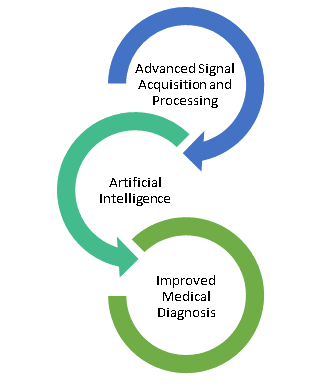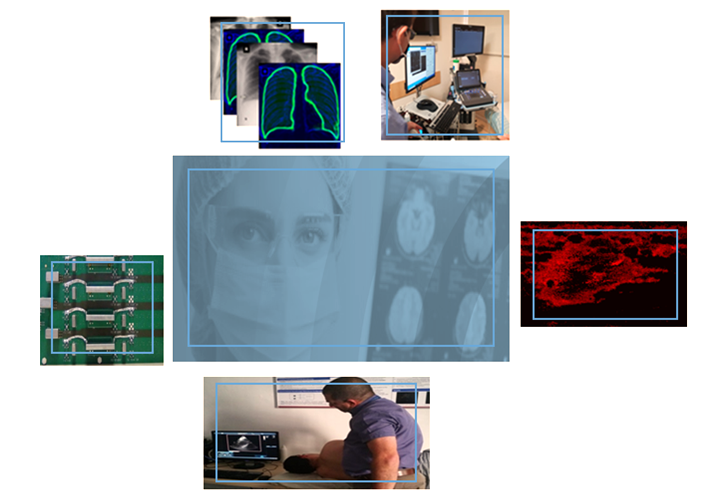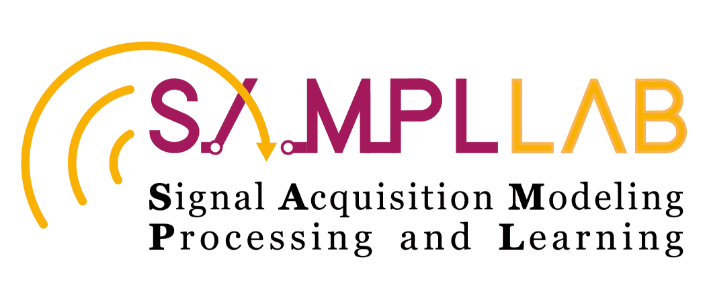Harness Innovations in Signal Processing and Artificial Intelligence -
for the Welfare of Patients Worldwide!
Over the course of the last two decades, biomedical engineering has become an essential component of both clinical care and scientific research. Yet, it is still subject to constraints in data acquisition and processing, which limit data quality and resolution and make imaging devices more cumbersome and challenging to operate. Numerous medical devices entail complex setups that involve patient contact and require a high level of technician expertise.
 In the realm of medical imaging, the interpretation of images by radiologists is inherently susceptible to variations and inconsistencies. In certain scenarios, such as during surgery and in emergency settings, imaging techniques may not be available, rendering accurate diagnosis challenging.
In the realm of medical imaging, the interpretation of images by radiologists is inherently susceptible to variations and inconsistencies. In certain scenarios, such as during surgery and in emergency settings, imaging techniques may not be available, rendering accurate diagnosis challenging.
Recent progress in the realms of signal acquisition and processing, coupled with the widespread adoption of artificial intelligence (AI), may help overcome these challenges and make medical devices more efficient and accessible to everyone, everywhere and at any time.
The Manya Igel Center for Biomedical Engineering and Signal Processing, headed by Prof. Yonina Eldar, brings together scientists and clinicians to address health challenges of relevance to medical imaging and sensing, diagnosis and patient monitoring. The Center’s goal is to harness the vast expertise at the Weizmann Institute of Science in signal processing and AI for the benefit of patients. The uniqueness of our approach is that it targets the entire diagnostic chain, from the hardware and physics of the devices, through the data processing and AI, through the clinical implementation. We develop new forms of diagnostic devices and new processing methods to build future medical devices that are noninvasive, noncontact, high resolution, portable, and efficient.
The fruitful collaboration between Weizmann scientists and physicians, facilitated by the center, includes clinical studies for various medical applications, e.g.:diagnosis of malignancies, cardiac pathologies and inflammatory diseases, Covid-19 detection and outcome prediction, remote patient vital sign monitoring, remote monitoring of drug delivery, radar imaging, and many more.
Together with Prof. Eran Segal and Dr. Leeat Keren we formed a new academic course at WIS: “Advances in AI and Data Science for Healthcare”. The purpose of this new course is to expose students from various faculties to advances in the area of AI and Data Science for Healthcare, with the hope of stimulating interdisciplinary collaborations between students with computational background and students with biology background.
Our growing list of collaborators includes physicians from hospitals in both Israel and abroad:
- Rabin Medical Center.

- Schneider’s Children Medical Center.
- Sheba Medical Center.
- Rambam Medical Center.
- Shaare-Zedek Medical Center.
- Emek Medical Center.
- Memorial Sloan Kettering Cancer Center.
- NYU Langone.
- Massachusetts General Hospital.
In order to foster strong connections with physicians, our center organizes periodic “clinical forum” meetings, designed to facilitate joint brainstorming on unmet medical needs and explore potential research avenues to tackle them.
Similar periodic meetings are held with industry professionals through our “industry forum”, and we organize joint gatherings that bring together the medical community and the industry. One such example is our workshop on Translational AI and Engineering in Health and Communication (Dec-2022) , where we showcased our research in healthcare, communication, and radar technology.
In addition, our center actively promotes interdisciplinary research within the Weizmann Institute of Science. We strongly believe that by integrating concepts and tools from diverse disciplines, we can tackle challenges that may not be readily solvable by any single discipline alone. For that purpose, we:
- Engage in mutual scientific projects with other labs at the Weizmann Institute of science.
- Established the BeST (BEtween Science and Technology) seminar.
- Together with the Moross Integrated Cancer Center at Weizmann, we established the “Students’, Post-docs’ and Staff Scientists’ Research Awards Program for collaboration between computational and cancer research groups”. The aim of this program is to stimulate interdisciplinary collaborations among students and researchers from computational and cancer research groups within the Weizmann Institute of Science. Multiple research proposals were submitted in scope of this program, and selected proposals were awarded a prize .
For questions about the Center or to collaborate with us, please feel free to reach out to: yonina.eldar@weizmann.ac.il

